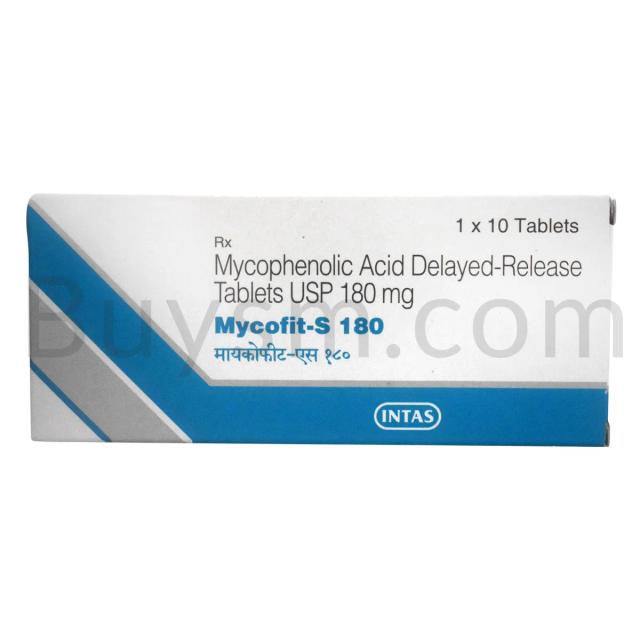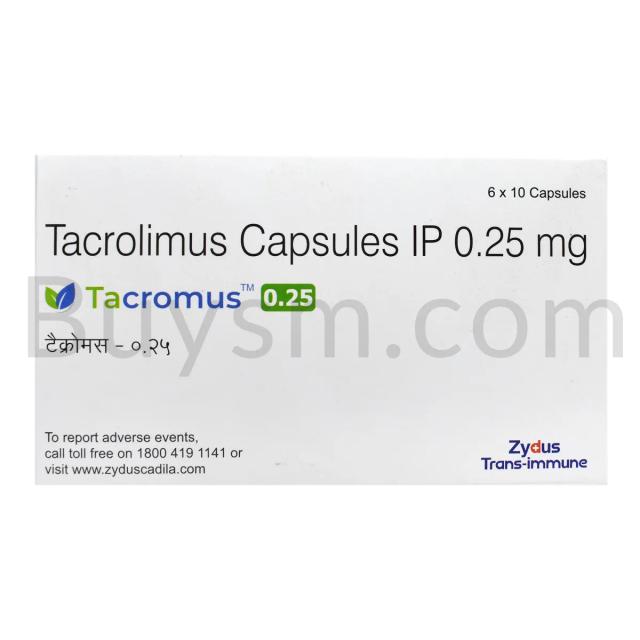

Advagraf 1 mg Capsule | 10 Capsules in 1 Strip
- Manufacturer/Marketed By
Astellas Pharma India Pvt Ltd
- Active Pharmaceutical Ingredient
Tacrolimus 1 mg
(Inclusive of all taxes)
Introduction of Advagraf Capsule
Advagraf 1 mg Capsule is a drug that suppresses the immune system. It is used in combination with other medicines to prevent the body from rejecting a transplanted organ, such as a kidney, liver or heart. By weakening the immune system, the medicine allows the transplanted organ to be accepted by the body, reducing the risk of rejection.
Advagraf 1 mg can cause side effects such as diarrhoea, nausea, vomiting and stomach pain. These side effects may be temporary and usually go away on their own. However, if they persist or worsen, contact your doctor or health care professional for advice. Also, Advagraf Capsule may cause serious side effects such as an increased risk of infection and lymphoma, so it is important to contact your doctor if you experience any unusual symptoms. Use of this medicine may also cause drowsiness and dizziness, so it is important to avoid activities that require alertness such as driving or operating heavy machinery.
Tacrolimus Capsule 1 mg should not be taken during pregnancy, while you are trying to become pregnant or while you are breastfeeding as it may cause birth defects or miscarriage. It is important to tell your doctor if you have any signs of infection or any unexpected bruising or bleeding before taking Advagraf Capsule. You should also tell your doctor about any other medicines you are taking as they may interact with Tacrolimus Capsule 1 mg. You will have regular blood tests to check the number of blood cells, and sugar and cholesterol levels in your blood.
Advagraf 1 mg Strip before eating or as directed by your doctor. The dose and the length of time you are treated will depend on your condition. Take it at the same time each day to help maintain a regular level of it in your body. Do not stop taking Advagraf Capsule without consulting your doctor, as this may increase the risk of organ rejection. Use caution when taking Tacrolimus Capsule 1 mg as it suppresses the immune system and may increase the risk of getting infected.
Uses of Advagraf Capsule
Prevention of organ rejection in transplant patients: Advagraf 1 mg Capsule is an immunosuppressive drug commonly used to prevent organ rejection in transplant patients. Immunosuppressant Drug Advagraf works by inhibiting the activity of immune cells, which can help to reduce the risk of transplant rejection.
Benefits of Advagraf Capsule
Immunosuppressant Drug Advagraf prevent the rejection of transplanted organs, such as the kidney, liver, and heart. It works by suppressing the immune system, which reduces the risk of the body rejecting the transplanted organ.
Advagraf Capsule may also be effective in treating certain autoimmune disorders, such as lupus, sarcoidosis, and myasthenia gravis.
Tacrolimus Capsule 1 mg is less likely to cause infections compared to other immunosuppressive drugs.
Advagraf 1 mg Capsule can be used in combination with other immunosuppressive medications, such as cyclosporine, to increase its effectiveness.
Side Effects of Advagraf Capsule
Like all medications, Advagraf 1 mg Capsule may cause some side effects. If you experience any of these side effects, contact your doctor as soon as possible. Your doctor may be able to suggest ways to manage or reduce the severity of these side effects.
Most Common Side Effects of Advagraf Capsule
- Pain or burning when you urinated
- dark urine
- Yellowing of the skin or eyes
- Loss of muscle control
- Confusion
- Thinking problems
- Pain or burning when you urinated
Common Side Effects of Advagraf Capsule
- Diarrhoea
- Nausea
- Vomiting
- Stomach pain
- Headache
- Rash
- Fever
- Dizziness
- Sore Throat
- Diarrhoea
How to Use Advagraf Capsule?
Immunosuppressant Drug Advagraf on an empty stomach, at least 1 hour before or 2 hours after eating. The exact dosage and duration of treatment will be determined by a doctor and will depend on the individual's condition and response to the medication. It's very important to take Tacrolimus Capsule 1 mg exactly as prescribed by your doctor and not to change the dose or stop taking Advagraf Capsule without first consulting your doctor. It's also important to keep all appointments with your doctor and lab tests while taking this Immunosuppressant Drug Advagraf to check your progress and monitor for side effects.
How Advagraf Capsule Works?
Advagraf 1 mg works by inhibiting the activity of a protein called calcineurin. Calcineurin is involved in activating T cells, a type of white blood cell that plays a key role in the immune response. By inhibiting calcineurin, Advagraf 1 mg Capsule suppresses the activation of T cells, which in turn helps to prevent the rejection of transplanted organs.
Safety Advices Advagraf Capsule
Kidney
Use with Caution
Patients with kidney disease should use Tacrolimus Capsule 1 mg with caution. It is important that patients with kidney disease monitor their kidney function closely while taking Advagraf 1 mg and report any unusual symptoms or changes in kidney function to their doctor or health care professional. The dose of Advagraf 1 mg Capsule may need to be adjusted in patients with kidney disease.
Breastfeeding
Unsafe
Breastfeeding is not recommended while you are taking Advagraf Capsule. It is possible that Immunosuppressant Drug Advagraf may pass into breast milk and cause harm to the baby. It is important to talk to your doctor about the possible risks and benefits of continuing to breastfeed if you are breastfeeding and taking Immunosuppressant Drug Advagraf. Your doctor will be able to help you make the decision that is best for you and for the health of your baby.
Pregnancy
Unsafe
The use of Immunosuppressant Drug Advagraf during pregnancy may not be safe, as there is some evidence from animal studies that it may harm the developing foetus. You must talk to your doctor about the potential risks and benefits of taking Advagraf 1 mg Strip while pregnant. Your doctor can help you make the best decision for you and your baby.
Liver
Use with Caution
Patients with liver disease should use Advagraf 1 mg Strip with caution. It is important that patients with liver disease monitor their liver function closely and report any unusual symptoms or changes to their doctor. The dose for Advagraf Capsule may require adjustment in patients with liver disease.
Driving
Unsafe
Advagraf 1 mg Capsule may cause dizziness, fatigue, and difficulty concentrating and coordinating, which may affect your ability to drive a vehicle safely. It is important to follow your doctor's instructions and take necessary precautions, such as avoiding driving a vehicle or operating heavy machinery if you suffer from the side effects of this Advagraf 1 mg Strip.
Alcohol
Unsafe
Drinking alcohol while taking Tacrolimus Capsule 1 mg is not recommended. Alcohol may increase the risk of side effects or interfere with the effectiveness Advagraf Capsule. Before drinking alcohol while taking any medicine, it is best to talk to your doctor or pharmacist.
Similar Medicines
Organ Transplant
Why customers like you choose BuySM.com?

Genuine Medicine
We maintain complete transparency in our sourcing and supply chain processes.

Secure Payments
This ensures that all data exchanged between your browser and our server remains confidential and secure

Fast Delivery
Stay informed about the status of your order with our real-time tracking feature.

Best Price & Offer
Enjoy even greater savings by taking advantage of our bundle offers.

5,000
Total Customers

15,000+
Products Sold Out

10,000+
Orders Delivered

10+
Cities










